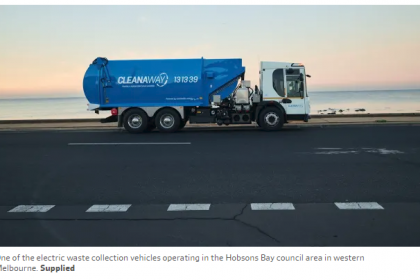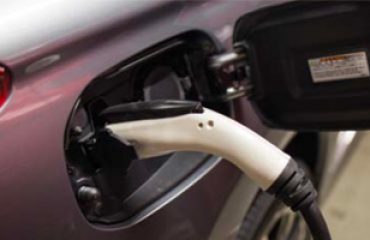
The chief executive of waste management group Cleanaway says a pioneering trial of electric rubbish trucks in a council area in Melbourne is showing promising signs in its early stages.
The electric trucks have a range of 180 kilometres before they need to be recharged and the first has been operating for the past few weeks in the City of Hobsons Bay, which covers 12 suburbs in western Melbourne.
Cleanaway chief executive Vik Bansal said there were good signs on the operating costs for the vehicles for kerbside collections, because they needed to be kept low for the new technology to be viable in the long term.
“At this stage, the trials are progressing well but it is a bit too early to fully gauge their success,” Mr Bansal said on Tuesday.
“So far the electric trucks are showing positive signs in terms of their cost to operate and overall reliability.”
Jonathan Marsden, mayor of the City of Hobsons Bay council area that encompasses 88,000 people and suburbs such as Williamstown, Altona and Newport, said it was only a small part of the overall fleet of rubbish collection vehicles, but the council wanted to be a leader in this sector.
“It’s early days obviously, and I think as battery technology improves they will be able to carry even greater payloads,” Mr Marsden said.
Local residents were curious about whether the electric vehicles would be coming to collect their own household rubbish.
“It’s a small part of a very big fleet,” he said.
Range and noise
The vehicles were assembled in Bundaberg in Queensland under a collaboration with SEA Electric and Superior Park.
The vehicles have a range of between 180 kilometres to 200 kilometres before they require recharging, and the drive system is able to generate electricity when braking.
They are also much quieter than regular waste collection vehicles, which has local governments across Australia eyeing the potential to cut road noise for early morning collections and keep the vehicles off the road in peak-hour traffic in congested areas.
Mr Bansal said there was a lot of opportunity to advance this type of technology. The company was also closely monitoring the costs and service levels to make sure it was a viable option over the long term.
Delivering a consistent and reliable service was fundamental to Cleanaway, and the trial needed to prove there wasn’t a significant increase in waste collection costs for ratepayers.
Cleanaway operates about 5000 waste collection vehicles around Australia.
Other local council areas in Geelong and Moonee Valley are also scheduled to be part of trials with the electric rubbish trucks so that Cleanaway can test them in different settings with hills and unique local characteristics. READ MORE
Article by Simon Evans, Senior Reporter – Financial Review, June 11 2019





